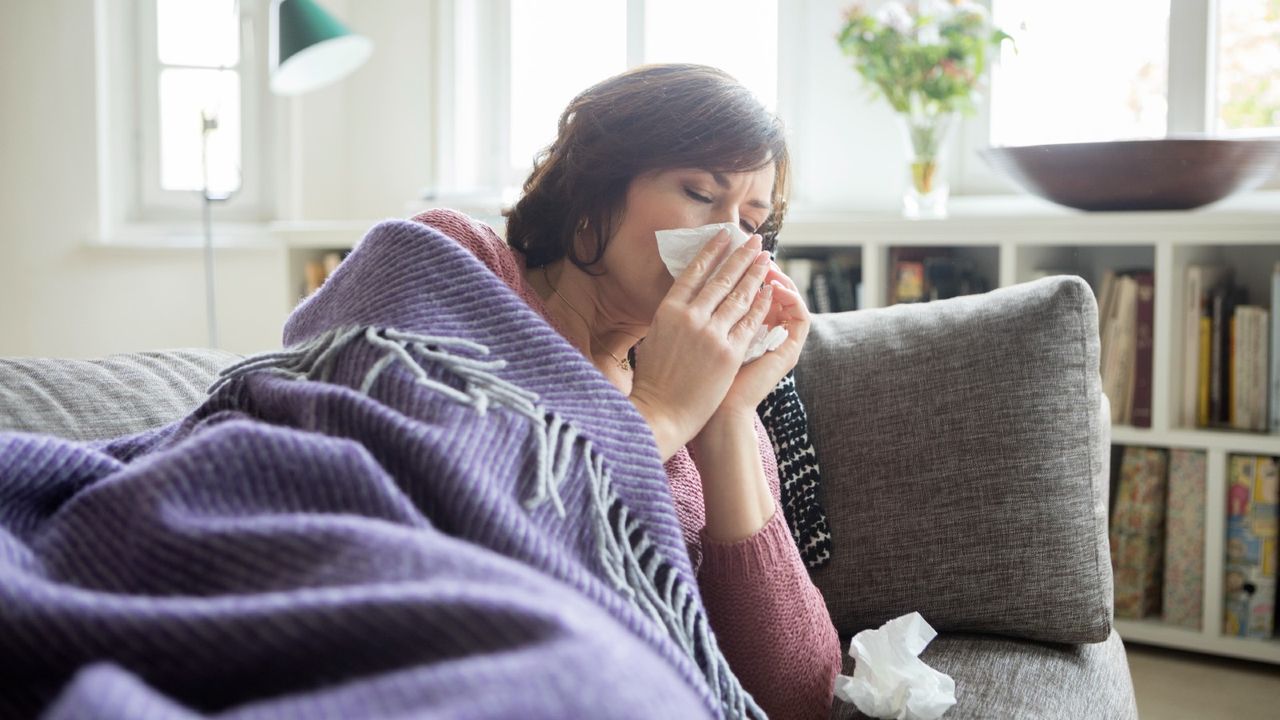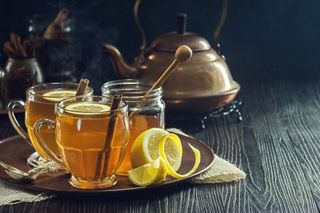Why is the worst cold ever spreading across UK and home remedies to try
The worst cold ever is currently spreading across the UK, here is why and how to look after yourself


An infection that is being called 'the worst cold ever' is currently spreading across the UK, we spoke to experts to sort the fact from the fiction and find out exactly what is going on.
Flu season is upon us and there is a nasty virus that is currently affecting people in the UK. Reports claim that this illness could be 'the worst cold ever,' and it is related to the multiple lockdowns that have taken place in the UK.
Although many people are already trying to get a covid booster jab which will be supported by an increased flu vaccine campaign attempting to keep the NHS afloat this winter, many people have already come down with a bad cold and many are concerned about the severity of this illness.
In order to find out more, woman&home spoke to Dan Bunstone, the Chief Medical Officer at online GP service Push Doctor, and Dr. Verity Biggs, General Practitioner and Women’s Health Lead at H3Health, about this cold and how we can protect ourselves.

You may also like...
Could CBT for insomnia finally be the solution to your sleepless nights?
What is the new cold going around and why is does it feel like the 'worst cold ever'?
Dr. Biggs explained that the UK may be experiencing 'the worst cold ever' because of COVID-19.
"The issue is that the population simply hasn’t been meeting and mixing for the last 18 months. We have all been staying inside or meeting outdoors, schools were shut, and we were wearing masks. Colds and Flu can spread at any time of the year, and now that children are back at school and we are returning to the office, the usual bugs are on their way around again."
Chief Medical Officer Dan Bunstone agreed and said that there is nothing particularly scary about this cold and the severe reactions some people are having are due to a weakened immune system.
Sign up for the woman&home newsletter
Sign up to our free daily email for the latest royal and entertainment news, interesting opinion, expert advice on styling and beauty trends, and no-nonsense guides to the health and wellness questions you want answered.
He said, "Over the last year, we have spent the majority of our time in lockdown, distancing ourselves from others, this has led to our immune systems being weaker as they haven’t had any exposure to illnesses such as the common cold."
"With the return to normal life, we are all beginning to mix more leaving us exposed to colds, which our bodies haven’t had to fight against during lockdown."
So there really is nothing to panic about, colds and flu aren't getting more severe, it's just our body's natural reaction after being coddled for the past 18 months.
Dr. Biggs concluded by adding that although the symptoms for COVID-19 are different from the common cold or flu, if there is any confusion about whether you may have COVID-19, you should take a PCR test.
"It’s so hard to know whether you have a simple cold, the flu, or COVID, as the symptoms are very similar, and especially if you have been vaccinated, then the symptoms aren’t the same as they were last year.
"The only way to know it isn’t COVID, is to get a PCR test (not a lateral flow test). You can get COVID again even after 2 vaccinations and booster jabs," she added.
What is the difference between the flu and a cold?
Dr. Biggs said colds and flu, "are both respiratory illnesses caused by a virus, but can be caused by different viruses.
"Influenza virus causes the flu, and common colds can be caused by rhinovirus, parainfluenza virus, and seasonal coronaviruses (yes coronaviruses aren’t a new thing). Colds are generally milder in nature, and the flu is worse and come on much quicker."
Dan added that there are also different symptoms that may arise from the flu that are not apparent with a cold.
"The symptoms of a cold tend to make themselves known gradually, so you’ll probably feel it coming on for a couple of days before the full blast of symptoms hits. On the other hand, the flu can appear to arrive suddenly, without warning."
"While many of the symptoms are the same, such as a runny or blocked nose and a cough, with flu you’re more likely to experience a fever, aching muscles, and feelings of exhaustion, as the infection spreads through your whole body."

Is honey and lemon good for a cold?
Dan says, "If a sore throat is your most troublesome symptom, honey and lemon is the way to go. It won’t necessarily speed up your recovery, but you’ll feel a lot less miserable now that your throat doesn’t feel like sandpaper!"
He adds that ginger can also be a natural ingredient to help make your tea extra potent. "Try a homemade honey, lemon and ginger tea which is packed full of natural ingredients and an added dose of steam to help clear your airways."
Dr. Biggs agrees and says honey and lemon, "Can be soothing for you, whether it be a sore throat or tickly cough." However, the doctor warned not to give honey to young children and toddlers.
"But you can’t give honey to children under the age of 1 due to rare but serious risks of food poisoning called infant botulism," she added.
Can you eat ice cream when you have a cold?
Dan warns that sometimes ice cream can cause your phlegm to become thicker which can be frustrating when you're suffering from a cold.
"Dairy products are known to make phlegm thicker and can potentially irritate your throat," He continued to bust a common myth as he added, "However, dairy doesn’t cause the body to make more phlegm."
Dan suggests that in actual fact there are some serious benefits to ice cream that may outweigh the thicker phlegm. "Eating ice cream can soothe your throat along with providing the body with calories that you may be lacking when you are ill," says Dan
Dr. Biggs also agreed with this comment and says that she is all for ice cream or anything that you may find soothing.
"Yes absolutely, in reality, you can have anything you want. They used to say 'feed a cold, starve a fever', but this isn’t true. If you have a sore throat, then ice cream will be soothing, and if you have a temperature, this could help also," concluded the Doctor.

What home remedies are best to fight a cold?
Dan highlighted that there are four key things that you can do at home to make sure that if you are suffering from a cold, your recovery is as speedy as possible. Dan explains that soup, a balanced diet, spicy foods, and rest, can all aid you on the road to recovery.
- SOUP—"Any broth-based soup will help you feel a little better. You should avoid creamy soups, as these are higher in fat (which, as we know, hampers your immune system), and consider including some vegetables in your broth to get even more nutrients."
- Balanced Diet—"High-fat diets have been shown to slow down your immune system’s response to infection, which will make it harder to fight off infections such as a cold. You need the nutrients provided by a balanced diet to help your recovery."
- Spicy food—"The chemical that gives chilli peppers their spice is called capsaicin. If you’re coming down with a cold, chili peppers can ease congestion and reduce swelling around your nose and throat. It’ll also help make your mucus thin enough for your body to cough or sneeze it away."
- Rest—"When all’s said and done, resting is one of the best ways to help your body shake off a cold. As tiredness is a symptom of a cold, going about your usual routine is only going to make this worse."
Dr. Biggs also says that the best home remedies available are, "Vitamin C, Zinc, Water, Omega 3 fish oils, Echinacea, ginger, and honey."
However, the doctor added that the "evidence base is limited for the effectiveness of these natural remedies." So if you are really suffering or think you may need antibiotics for an infection, it is always best to contact your GP over the phone or in person.
Laura is the Entertainment Editor for woman&home who primarily covers television, film, and celebrity news. Laura loves drinking and eating and can often be found trying to get reservations at London's trendiest restaurants. When she's not wining and dining, Laura can also be found travelling, baking, and hiking with her dog.
-
 The White Company's Hypoallergenic Mattress Topper is surprisingly affordable and a dream to sleep on
The White Company's Hypoallergenic Mattress Topper is surprisingly affordable and a dream to sleep onThe The White Company Hypoallergenic Comfort Topper offers a gentle, supportive layer to your sleep set-up for a surprisingly affordable price.
By Laura Honey Published
-
 Gwyneth Paltrow’s classic pinstripe pyjamas will keep you cool and comfortable on warm nights
Gwyneth Paltrow’s classic pinstripe pyjamas will keep you cool and comfortable on warm nightsChic and comfortable? Her stylish pyjama set is our new go-to
By Charlie Elizabeth Culverhouse Published
